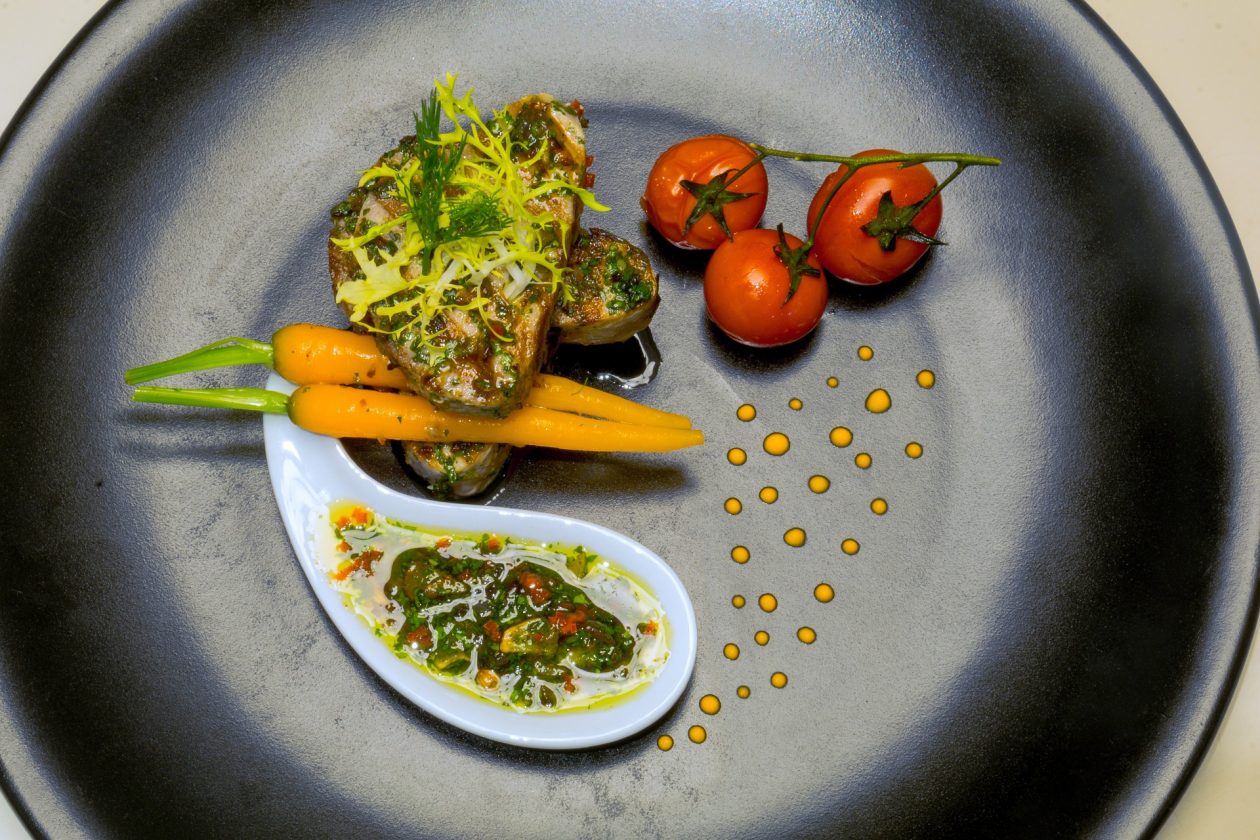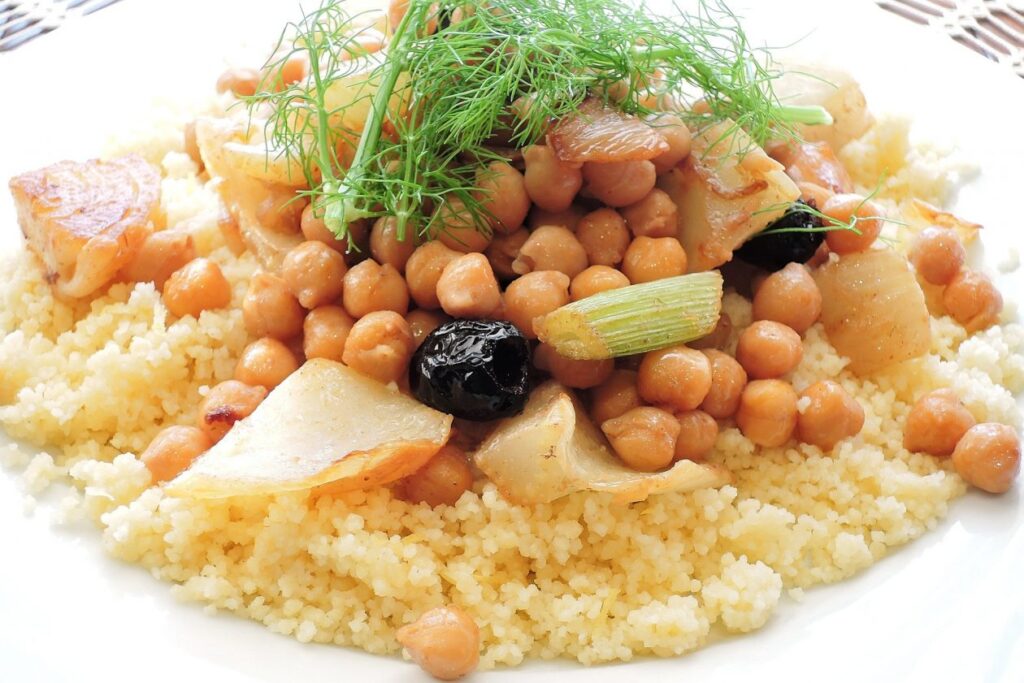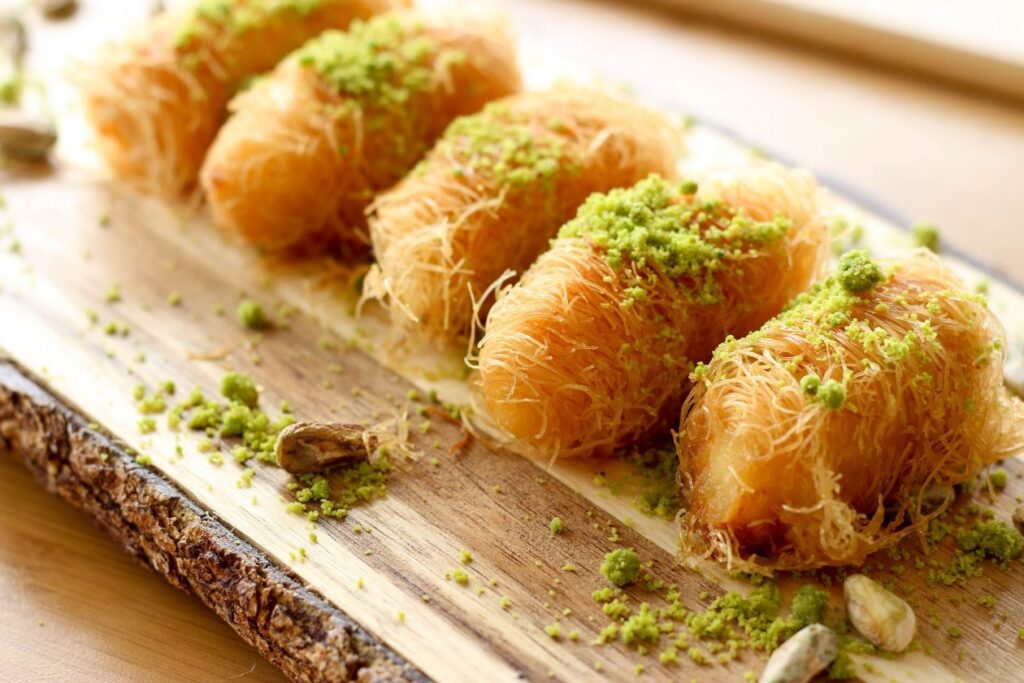Is Halal Food Healthy? Exploring Misconceptions and Health Advantages
 / Discover more like this here: https://stylevitally.com/is-halal-food-healthy/?feed_id=5922&_unique_id=65dde3e1e3ab5&utm_source=&utm_medium=ycfemb83&utm_campaign=FS%20Poster
/ Discover more like this here: https://stylevitally.com/is-halal-food-healthy/?feed_id=5922&_unique_id=65dde3e1e3ab5&utm_source=&utm_medium=ycfemb83&utm_campaign=FS%20Poster
Introduction
The issue of whether or not Halal food is healthy has received a lot of attention lately, moving beyond its religious roots to become a major concern for people concerned about their health all around the world. The Arabic word "halal," which means "permissible" or "lawful," refers to food that complies with Islamic dietary regulations as well as more general ideas of sustainability, animal welfare, and ethical sourcing. Although it has its roots in religious custom, halal cuisine has expanded to include a holistic approach to health and nutrition, appealing to a wide range of populations looking for wholesome, sustainably produced food.
The allure of Halal cuisine extends beyond its religious importance and includes potential health advantages and ethical reasons. Halal certification, which denotes adherence to strict standards of hygiene, sanitation, and ethical practices across the supply chain, has evolved as a symbol of trust and integrity as consumers get increasingly picky about the provenance and quality of their food. Halal food's increasing popularity indicates a more conscious eating trend in which consumers value ethical sourcing, sustainability, and transparency when making food decisions.
Furthermore, the wider acceptance of Halal food as a respectable substitute for those looking for healthier and more morally upright eating options results from the easier access to and availability of Halal-certified goods. When it comes to fresh, healthful ingredients, the guarantee of humane treatment of animals, or the lack of dangerous additives, halal food appeals to customers who want to make well-informed decisions that complement their objectives and beliefs. In this regard, investigating the query "Is Halal Food Healthy?" entails a nutritional analysis and a look at the more general ideals and concepts of Halal eating customs.
Understanding Halal Food
Understanding Halal food is necessary to appreciate its importance and possible health effects. Food that complies with Islamic dietary regulations is referred to as halal food. This includes a wide variety of foods regarded as both allowed (Halal) and prohibited (Haram) by Islamic law. This differentiation goes beyond ingredient-level considerations to have different facets of food preparation and consumption, exhibiting an all-encompassing perspective on dietary customs within the Islamic faith.
In Islamic dietary regulations, permissible foods (Halal) are considered pure and allowed for consumption. These usually include things like fruits, vegetables, cereals, and some animal products that are obtained in ways that are deemed appropriate. On the other hand, foods classified as banned (Haram) include items that are considered unclean or forbidden from being consumed, like alcohol, pig and its byproducts, and some meats that aren't killed by Islamic law.
A crucial component of Halal cuisine, especially regarding meat, is the strict observance of slaughterhouse regulations. The process of slaughtering an animal for halal meat is called Zabiha, and it entails repeating the name of Allah as you quickly cut the animal's carotid artery, windpipe, and jugular vein with a sharp knife. Furthermore, some fish, birds, and mammals may be used to produce Halal meat; predatory animals and birds of prey are normally not allowed.
Knowledge of the standards for preparing Halal meat will help you make informed decisions about its quality and moral implications. People can respect their religious beliefs and make educated decisions about their eating preferences by following these rules. Understanding the importance of Halal cuisine in Islamic culture also promotes tolerance and respect for other eating habits, which is important in today's globalized society.
Nutritional Analysis of Halal vs. Non-Halal Meat
Researchers have thoroughly compared the physicochemical and nutritional properties of both types of meat, especially beef, and lamb, while analyzing the nutritional analysis of Halal versus non-Halal meat. These investigations aim to shed light on any appreciable variations in composition and possible health effects between halal and non-halal meat.
A significant difference between the pH values of non-Halal and Halal beef was noted in these investigations. When an animal is slaughtered for Halal, its blood is extracted, which results in meat that has a lower pH than meat from non-Halal animals. This pH variation may affect the meat's overall quality, flavor, and softness, which may affect the tastes and culinary experiences of the consumers.
Furthermore, studies have shown that non-Halal and Halal meat differ in protein and fat content. Even though the variations may not be significant, they impact people trying to meet certain nutritional needs or dietary restrictions. For example, people trying to cut back on saturated fat for heart health reasons could prefer halal meat's lower fat content, while people attempting to up their protein consumption for weight loss or muscle building might find it more appealing.
Customers who prioritize health and nutrition in their food choices must comprehend these differences in the physico-chemical and nutritional properties of Halal and non-Halal meat. Even though both kinds of meat can be included in a balanced diet, people should consider these things when deciding what foods to eat to meet their health goals and nutritional preferences. More research and public education are essential to clarify the possible health effects of selecting Halal meat over non-Halal alternatives and enable consumers to make well-informed decisions that meet their unique needs and preferences.
Health Benefits of Halal Food

When evaluating the health advantages of a Halal diet, it's critical to explore the wider implications for general well-being rather than just religious observance. The emphasis on eating fresh, healthful products while avoiding dangerous additions and substances is one of the main characteristics of Halal cuisine. This emphasis on whole, natural foods aligns with many healthy eating guidelines that nutritionists and other health professionals worldwide advocate.
Following the tenets of the Halal diet, people are urged to prioritize eating fruits, vegetables, grains, and lean meats that are obtained acceptably. This focus on eating a well-balanced diet full of vital nutrients can benefit many aspects of health, such as disease prevention, managing weight, and cardiovascular health. Additionally, abstaining from illegal substances like alcohol and specific meats might help lead a better lifestyle in general.
The emphasis on healthful, nutrient-rich foods in a Halal diet can help with weight control attempts to keep a healthy weight. People may be less likely to overeat or indulge in unhealthy snacks if they choose fulfilling and full foods, which could aid in weight loss or maintenance. Furthermore, avoiding processed foods' high fat and sugar content can help maintain better body weight and general well-being.
Furthermore, considering the emphasis on lean proteins and heart-healthy components, adhering to Halal dietary rules may positively affect cardiovascular health. People can help reduce their risk of heart disease and related problems by eating a diet rich in fruits, vegetables, healthy grains, and lean cuts of Halal meat. This strategy aligns with advice from health groups that support a diet high in plant-based foods and low in cholesterol and saturated fats. The health advantages of a Halal diet go beyond religious compliance, providing people with a means of achieving greater longevity and well-being through thoughtful food selection.
Ethical Considerations and Cultural Diversity

The ethical issues underlying the manufacture of halal food must be explored while discussing its health benefits. The humane treatment of animals throughout the slaughter process is one of the core tenets of halal cuisine. In contrast to conventional techniques that could entail stunning animals before slaughter, Halal practices emphasize a quick and painless procedure that upholds the animal's dignity. Because of its emphasis on moral treatment, halal cuisine appeals to people worried about the ethical ramifications of their food choices because it aligns with larger social beliefs surrounding animal welfare and compassion.
In addition, the rich tapestry of cultural diversity and culinary traditions found in halal cuisine reflects the diversity of Muslim populations across the globe. From delicious South Asian curries to fragrant Middle Eastern spices—halal cuisine features diverse flavors and cooking methods honoring a cultural legacy. This cultural diversity promotes a deeper awareness and comprehension of other traditions and practices and brings vibrancy to the culinary scene. By discovering Halal food, people can go on a delectable journey that crosses national borders and promotes cross-cultural dialogue and harmony.
Following Halal dietary requirements promotes mindfulness and cultural awareness in food intake, in addition to its ethical and cultural aspects. Adhering to the principles of Halal encourages people to reflect on the origins and quality of their food, strengthening their bond with the food's source. Because of this increased awareness, we appreciate and respect our food, encouraging mindful eating habits that improve our general health. Furthermore, people can improve their cultural literacy and appreciation of the rich tapestry of global cuisines by accepting Halal food as a part of a diversified culinary landscape. This fosters tolerance, understanding, and unity in a world that is becoming more interconnected.
Halal and Non-Halal Foods
Halal food adheres to specific guidelines outlined in the Quran and Sunnah, while non-Halal food items are prohibited for consumption by Muslims. This guide provides a clear distinction between Halal and non-Halal foods to help individuals make informed dietary choices in accordance with their religious beliefs.
Halal Foods:
- Chicken: Halal-certified chicken is permissible for consumption according to Islamic dietary laws.
- Beef: Beef can be consumed by Muslims if prepared according to Halal guidelines.
- Lamb: Lamb meat adhering to Islamic slaughter practices is considered Halal.
- Fish: Most fish are permissible in Islam, with a few exceptions. Halal-certified fish are suitable for consumption.
- Fruits and Vegetables: All fruits and vegetables are Halal, as long as they are not contaminated with non-Halal substances.
- Whole Eggs: Eggs from Halal-certified sources are permissible for consumption.
- Beans and Lentils: Plant-based protein sources like beans and lentils are Halal and recommended for a balanced diet.
- Nuts and Seeds: Nuts and seeds are Halal and offer various health benefits when consumed in moderation.
- Grains: Grains such as rice, barley, oats, and wheat are considered Halal and form the basis of many meals.
- Fresh Dairy Products: Milk, cheese, yogurt, and other dairy products are Halal unless they contain non-Halal additives.
Non-Halal Foods or (Haram):
- Pork: Pork and its by-products are strictly forbidden in Islam.
- Carnivorous Animals: Animals that primarily eat meat, such as certain types of fish and birds, are considered non-Halal.
- Gelatin: Gelatin derived from non-Halal sources, often from pigs, is not permissible for Muslims.
- Alcohol: All forms of alcohol, including beverages and food containing alcohol, are considered non-Halal.
- Blood: Consumption of blood from animals is prohibited in Islam.
- Intoxicants: Substances that alter one's state of mind or behavior, including drugs and narcotics, are considered non-Halal.
- Non-Halal Meat: Meat that is not slaughtered according to Islamic guidelines or from non-Halal animals is not permissible.
- Non-Halal Additives: Food additives and ingredients derived from non-Halal sources are not suitable for consumption by Muslims.
- Non-Halal Processed Foods: Processed foods containing non-Halal ingredients or additives are not considered permissible.
In summary, adhering to Halal dietary guidelines involves consuming permissible foods while abstaining from forbidden items. Halal foods include meats that are slaughtered according to Islamic principles, fruits, vegetables, grains, dairy products, and certain seafood. On the other hand, non-Halal foods encompass pork and its derivatives, carnivorous animals, alcohol, intoxicants, and foods containing non-Halal additives or ingredients. Understanding these distinctions empowers individuals to make informed choices in line with their religious beliefs and dietary requirements.
Inspiring Halal Meal Creations
Halal meals offer a wide array of delicious and nutritious options that cater to diverse tastes and dietary preferences. Whether you're planning a family dinner or a special gathering, these wholesome halal meal ideas are sure to satisfy your cravings while adhering to Islamic dietary guidelines.
- Chicken Biryani:
- Aromatic basmati rice layered with tender chicken pieces cooked in a blend of spices.
- Garnished with caramelized onions, fresh coriander, and fried cashews for added flavor and texture.
- Grilled Salmon with Lemon Herb Sauce:
- Succulent salmon fillets marinated in a zesty lemon herb sauce and grilled to perfection.
- Served with a side of steamed vegetables or a crisp garden salad for a refreshing touch.
- Vegetable Stir-Fry with Tofu:
- Colorful medley of bell peppers, broccoli, carrots, and snap peas stir-fried with tofu in a savory sauce.
- Accompanied by steamed jasmine rice or noodles for a satisfying and wholesome meal.
- Chickpea and Spinach Curry:
- Hearty chickpeas simmered in a rich tomato and coconut milk-based curry sauce with tender spinach leaves.
- Best enjoyed with fluffy naan bread or aromatic basmati rice for soaking up the flavorful sauce.
- Grilled Chicken Caesar Salad:
- Grilled chicken breast slices served atop crisp romaine lettuce, tossed with Parmesan cheese, croutons, and creamy Caesar dressing.
- A light yet satisfying option for a quick and nutritious lunch or dinner.
- Beef Kebabs with Tzatziki Sauce:
- Juicy beef kebabs marinated in a blend of Middle Eastern spices and grilled to juicy perfection.
- Served with homemade tzatziki sauce, pita bread, and a refreshing cucumber-tomato salad.
- Quinoa and Black Bean Salad:
- Nutrient-packed quinoa mixed with protein-rich black beans, sweet corn, diced tomatoes, and chopped cilantro.
- Tossed in a tangy lime vinaigrette for a burst of flavor in every bite.
From indulgent biryanis to refreshing salads, these halal meal ideas showcase the diversity and richness of Islamic cuisine. Whether you're craving comfort food or seeking a lighter option, there's something for everyone to enjoy while adhering to halal dietary principles. With wholesome ingredients and vibrant flavors, these dishes are perfect for nourishing the body and delighting the taste bud
Halal Food Options for Weight Loss

It's important to highlight particular Halal food options that can help people achieve their goals while examining "Is halal food good for weight loss?" in the context of weight reduction. Chapati, a sort of unleavened flatbread prepared from whole wheat flour, is one such choice. Chapati is a satisfying and nutrient-dense option for people trying to control their weight because it is low in fat and fiber. Furthermore, stuffed vegetables—like bell peppers or zucchini—packed with lean meats, veggies, and spices provide a filling, low-calorie dinner choice compliant with the Halal diet.
Another great option for those looking to follow Halal requirements and lose weight is whole eggs. High-quality protein, like that found in eggs, can aid in promoting feelings of fullness and lowering total calorie intake. Beans, nuts, and seeds are also nutrient-dense foods that offer a combination of fiber, protein, and healthy fats, which makes them an excellent complement to a diet plan for losing weight. By adding these plant-based protein sources to meals, people can assist their weight loss efforts and meet their nutritional needs.
Besides plant-based alternatives, lean protein sources like fish and poultry conform to Halal dietary guidelines and can help with weight management. Fish that has been baked or grilled, such as trout or salmon, is high in omega-3 fatty acids, which have been demonstrated to support heart health and may help with weight loss. Analogously, skinless chicken breast is an adaptable protein choice that can be cooked in various ways to accommodate a range of tastes and preferences. People can assist their weight loss efforts while consuming tasty and nourishing meals that align with their cultural and religious beliefs by including these healthful Halal cuisine options.
Is Halal Food Healthy?
A. Answer in short:
Yes, Halal food can be a healthy dietary choice for individuals, especially when consumed as part of a balanced diet. The Halal nutritional guidelines focus on the consumption of wholesome, unprocessed foods while prohibiting the intake of certain harmful substances, such as alcohol and pork. By adhering to these guidelines, individuals can make nutritious food choices that support their overall health and well-being.
B. Answer in depth with value if possible:
Halal food encompasses various dietary choices that adhere to Islamic principles, emphasizing cleanliness, purity, and ethical considerations. While Halal food primarily focuses on religious observance, there are also potential health benefits associated with following Halal dietary guidelines. For example, the prohibition of alcohol and the requirement for humane treatment of animals in Halal slaughter practices can contribute to a healthier lifestyle.
From a nutritional perspective, Halal food often includes lean meats, fruits, vegetables, and whole grains, essential components of a balanced diet. These foods provide important nutrients such as protein, vitamins, minerals, and fiber, supporting various aspects of health, including muscle growth, immune function, and digestive health. Additionally, avoiding certain additives and preservatives commonly found in processed foods aligns with recommendations for reducing the intake of potentially harmful substances.
It's important to note that the healthfulness of Halal food ultimately depends on individual food choices and dietary habits. While Halal food can provide a foundation for a healthy diet, it's essential to consider factors such as portion sizes, cooking methods, and overall dietary patterns. By making informed food choices and incorporating a variety of nutrient-rich foods into their diet, individuals can optimize the health benefits of Halal food while enjoying delicious and culturally significant meals.
FAQ Section:
Q: Can halal food be healthy?
A: Yes, halal food can indeed be healthy. Halal dietary guidelines promote the consumption of fresh, wholesome foods while prohibiting the consumption of harmful substances like alcohol and pork. Individuals can maintain a balanced and nutritious diet by adhering to these principles and choosing nutrient-rich options such as fruits, vegetables, lean meats, and whole grains.
Q: What foods are OK for halal?
A: Permissible Foods (halal) in Islamic dietary laws include various fruits, vegetables, grains, nuts, seeds, dairy products, and certain types of meat and seafood. Additionally, halal-certified products such as processed foods, beverages, and condiments are available to ensure compliance with halal standards.
Q: What kind of food is halal?
A: Halal food refers to any food or beverage that complies with Islamic dietary laws. This includes foods permissible to consume according to Quranic principles and the teachings of Prophet Muhammad (peace be upon him).
Q: Is halal better than organic?
A: Halal and organic food comparison depends on individual preferences and dietary priorities. Halal food focuses on adherence to Islamic dietary laws, while organic food emphasizes the absence of synthetic pesticides, fertilizers, and GMOs. Both options can contribute to a healthy diet, and the choice between them ultimately depends on personal values and priorities.
Q: Is halal meat less toxic?
A: Halal meat is not inherently less toxic than non-halal meat. The safety and quality of beef depend on various factors, including the animal's diet, living conditions, and processing methods. However, some individuals may prefer halal meat due to its adherence to Islamic slaughter practices, which involve swift and humane methods.
Q: What should be avoided in halal food?
A: In halal food, avoiding ingredients and products considered haram (forbidden) in Islamic dietary laws is important. This includes alcohol, pork and its byproducts, blood, and any meat that is not slaughtered according to Islamic principles.
Q: Why are Halal Guys so popular?
A: Halal Guys, a renowned fast-food chain, has gained popularity due to its flavorful and affordable halal offerings, particularly its chicken and gyro platters. The brand's expansion into diverse locations and its focus on providing halal options to a wide audience have contributed to its widespread appeal.
Q: Does halal meat have less protein?
A: No, halal meat does not inherently have less protein than non-halal meat. The protein content of beef depends on factors such as the animal's breed, age, and cut of meat rather than whether it is halal or non-halal.
Q: Can fish be halal?
A: Certain types of fish are considered halal, including those with scales and fins. Common examples include salmon, tuna, cod, and trout. However, fish that do not have scales, such as catfish and sharks, are considered haram (forbidden) in Islamic dietary laws.
Q: Does halal meat have more protein?
A: Halal meat does not necessarily have more protein than non-halal meat. The protein content of beef is primarily determined by factors such as the animal's breed, diet, and muscle composition rather than whether it is slaughtered according to Islamic principles.
Q: Is it important to eat halal?
A: The importance of eating halal food varies among individuals and communities. For those who adhere to Islamic dietary laws, consuming halal food is considered essential for spiritual and religious reasons. Additionally, some people may choose halal food for its perceived quality, ethical considerations, or personal preferences.
Q: What are the disadvantages of eating haram food?
A: Consuming haram (forbidden) food goes against Islamic dietary laws and may have spiritual and religious implications for individuals who follow these guidelines. Additionally, haram food may contain ingredients or substances considered unhealthy or harmful to human health.
Q: Is halal meat healthier?
A: The healthiness of halal meat depends on various factors, including the animal's diet, living conditions, and processing methods. While halal meat adheres to specific slaughter practices, its overall nutritional quality and health benefits are comparable to non-halal meat of similar quality.
Q: Why is halal better?
A: The perception of halal being better depends on individual perspectives and priorities. For those who follow Islamic dietary laws, halal food is better due to its adherence to religious principles and values. Additionally, some people may prefer halal food for its perceived quality, ethical considerations, and cultural significance.
Conclusion
In conclusion, a thorough investigation of the nutritional and health effects of Halal eating practices is prompted by the question, "Is Halal Food Healthy?" During our conversation, We explored several facets of Halal cuisine, ranging from compliance with Islamic dietary regulations to possible health advantages. A wide range of nutrient-dense options are available in halal cuisine, emphasizing eating healthful, unprocessed meals while eliminating dangerous things like alcohol and pork.
As we've seen, Halal cuisine adheres to more general healthy eating guidelines by stressing the value of top-notch, freshly sourced products and thoughtful meal selections. Following the dietary rules for Halal meat consumption allows people to provide their bodies with vital nutrients and enhance their general health. The variety of alternatives available in Halal cuisine allows one to create wholesome and delectable meals, whether by selecting lean meats, fresh fruits, vegetables, or entire grains.
Ultimately, I urge readers to adopt Halal eating practices for better nutrition and overall health. By adopting the all-encompassing perspective of Halal cuisine, which considers ethical and health issues, people can develop a stronger bond with their food and principles. People from different origins and cultures find that Halal food provides a gateway to nourishment and vitality, regardless of whether they are driven by their desire for healthier eating habits or their religious beliefs.
Reference
halalfoundation. 2022. “Muslim Dietary Laws & Fasting Practices You Need to Know - AHF.” American Halal Foundation. November 22, 2022. https://halalfoundation.org/muslim-dietary-laws-fasting-practices-you-need-to-know/.
America. 2024. “How to Keep Your Weight Loss Diet Halal? - the Halal Times.” The Halal Times. January 27, 2024. https://www.halaltimes.com/how-to-keep-your-weight-loss-diet-halal/.
Felton, Amber. 2022. “What Is Halal?” WebMD. WebMD. December 2, 2022. https://www.webmd.com/food-recipes/what-is-halal.
Carrasco, C., Pérez-Palacios, T., Luengo, L. M., Gómez, S., Fajardo, M., Gómez, M. D. L. Á., & Rodríguez, A. B. (2022). Nutritional quality and physiological effects of halal meat: A pilot study in non-Muslim consumers. Food Bioscience, 49, 101935. https://doi.org/10.1016/j.fbio.2022.101935
“GENERAL GUIDELINES for USE of the TERM “HALAL”.” 2024. Fao.org. 2024. https://www.fao.org/3/y2770e/y2770e08.htm.
https://stylevitally.com/is-halal-food-healthy/?feed_id=5922&_unique_id=65dde3e1e3ab5&utm_source=&utm_medium=ycfemb83&utm_campaign=FS%20Poster
Comments
Post a Comment